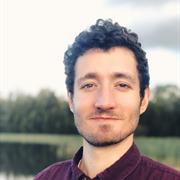
Dr. Martino Malerba
Details
-
College: School of Science
-
Department: School of Science
-
Campus: City Campus Australia
-
martino.malerba@rmit.edu.au
Open to
- Masters Research or PhD student supervision
- Industry Projects
- Collaborative projects
- Join a web conference as a panellist or speaker
About
Dr Malerba leads a team of researchers studying freshwater wetlands – both natural (e.g., wetlands), and artificial (e.g., farm dams, reservoirs, wastewater lagoons). His projects include:
- Determining the carbon and biodiversity benefits of restoring natural wetlands through revegetation and environmental watering.
- Testing floating wetlands for emission reduction in wastewater lagoons.
- Managing farm dams to improve farm productivity, water quality, biodiversity, and reduce greenhouse gas emissions.
- Developing low-cost, automated IoT devices for real-time greenhouse gas emissions and biodiversity monitoring.
- Identifying social drivers and barriers to enable the conservation of natural wetlands in agricultural properties.
RESEARCH INTERESTS
Teal carbon ecosystems, like coastal wetlands, are crucial in regulating greenhouse gases and mitigating climate change while providing essential habitats for native wildlife. However, their degradation due to land-use change, pollution, water extraction, and landscape modification diminishes their ability to act as biodiversity hotspots and carbon sinks, leading to the release of significant amounts of carbon back into the atmosphere.
Dr. Malerba’s laboratory focuses on quantifying carbon emissions, restoring degraded sites, and developing strategies for more sustainable practices. The team also investigates the social drivers of sustainable development and explores financial mechanisms to improve freshwater resource management.
For instance, farm dams rank among the highest greenhouse gas emitters of all freshwater ecosystems. Yet, simple management interventions, such as fencing to exclude livestock, can halve methane emissions, improve water quality, and create habitat for native species (Malerba et al., 2022, Global Change Biology).
Dr. Malerba frequently collaborates with engineers to develop new technologies that enhance field data collection. For example, the Pondi is a low-cost logger designed to monitor greenhouse gases like methane, carbon dioxide, and nitrous oxide in aquatic and terrestrial environments (Malerba et al., preprint). Also, Dr. Malerba is advancing AI technology for automatically monitoring species through soundscape analysis.
The Australian Research Council awarded Dr Malerba a DECRA Fellowship to investigate the sustainable management of freshwater systems. He collaborates with State (Dept. of Primary Industries and Regional Development) and Federal (Dept. of Climate Change, Energy, the Environment, and Water) authorities to develop new methodologies for generating financial incentives through carbon and biodiversity credits. He also collaborates with the Australian National Carbon Inventory team to refine greenhouse gas emission estimates from freshwater systems.
Research fields
- 410101 Carbon sequestration science
- 410406 Natural resource management
- 410604 Soil chemistry and soil carbon sequestration (excl. carbon sequestration science)
- 310304 Freshwater ecology
- 300201 Agricultural hydrology
- 400906 Electronic sensors
UN sustainable development goals
- 11 Sustainable Cities and Communities
- 15 Life on Land
- 13 Climate Action
Academic positions
- Senior lecturer
- RMIT University
- STEM College
- Melbourne, Australia
- 2024 – Present
- Alfred Deakin Fellow & ARC DECRA Fellow
- Deakin Univeristy
- School of Life and Environmental Sciences
- Burwood, Australia
- 2020 – 2024
- Research Fellow
- Monash University
- School of Biological Sciences
- Melbourne, Australia
- 2016 – 2020